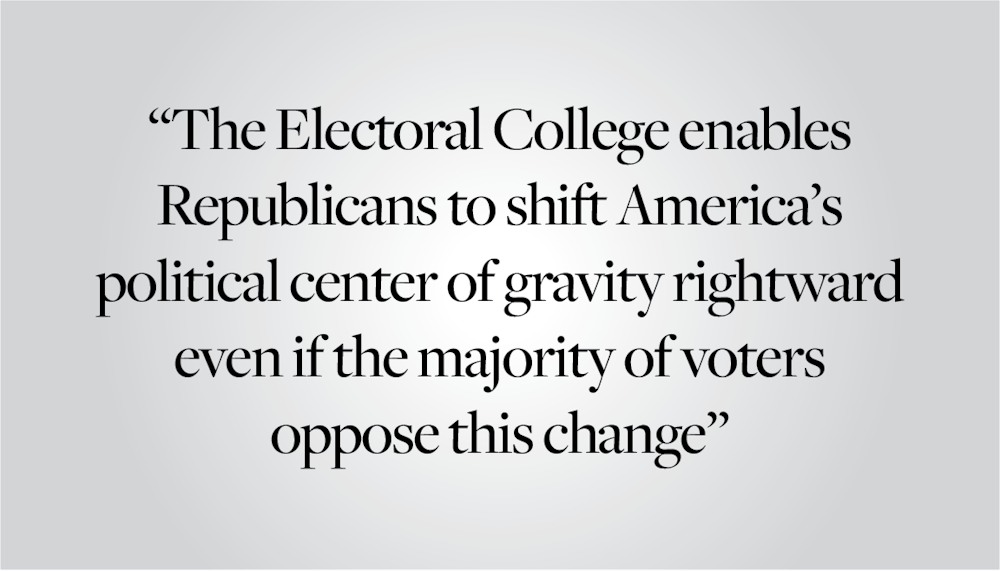Just under a year out from the 2024 election, it is clear that American politics are broken. This year alone has seen no shortage of embarrassing incidents, most notably the 22 agonizing days it took the House of Representatives to elect a new speaker. And with the rise of increasingly far-right Republican Party presidential candidates, a rightward shift appears to be on the horizon for the 2024 election — a shift in no small part thanks to the Electoral College.
The far-right’s rise in American politics is multifaceted. But the Electoral College is an important driver of this development that has often been left out of the discussion. Though plenty has been written about the system’s shortcomings, from its overrepresentation of smaller states to an excessive focus given to swing states, a key factor that is often overlooked is how the current system emboldens the Republican Party in pursuing far-right policies.
Under the Electoral College, Republicans “waste” far fewer votes than Democrats. Since each candidate can carry all of a state’s (except for Maine and Nebraska) electoral votes with a mere simple majority of the votes, all additional votes received by the winner of a state are essentially useless. This means that many votes in relatively politically homogeneous states like California and New York play a far less significant role in influencing the Electoral College than votes in a handful of swing states.
The Electoral College also advantages smaller states, since states are apportioned electoral votes totaling to their number of senators — always two — and representatives — which varies with population. This means that in 2020 California had about 677,345 votes per electoral college vote while Wyoming had about 188,000. Republicans hold a massive advantage in this respect, as the most Democratic states tend to be more populous than the most Republican ones. By winning the electoral votes of smaller states, in which individual voters hold more power, Republicans have a higher chance of winning presidential elections without winning the overall popular vote than Democrats. The 2000 election and 2016 election are recent examples of this phenomenon.
The design of our presidential election system has given Republicans far more political freedom than their national support would suggest. Republicans can afford to move right more than Democrats can afford to move left since the nature of the Electoral College means that Republicans can win popular minorities and still be nationally competitive. This power has, in turn, pushed the ideological center of the Republican Party further and further right. Nowhere is this more evident than the behavior of its presidential candidates, including Florida Governor Ron DeSantis’s book bans, Vivek Ramaswamy’s attacks on gender-affirming care, former Vice President Mike Pence’s strong opposition to reproductive rights and of course former President Donald Trump’s continued insistence that the 2020 election was stolen. The views of these Republican candidates, aiming to represent millions of Americans, only reflect a minority of the American public.
The Republican Party is now further right ideologically than almost all mainstream conservative parties in developed nations, and it can afford to push more and more radical positions in part due to the party’s advantage in the Electoral College. Had it not been for the Electoral College’s existence, these Republicans would have to win true majorities and would have been forced to adopt a more centrist approach to do so. There would be no room for polarizing politicians like Trump, and representatives like Rep. Matt Gaetz (R-Fla.) and Rep. Lauren Boebert (R-Colo.) would be considered political liabilities.
The Electoral College enables Republicans to shift America’s political center of gravity rightward even if the majority of voters oppose this change, resulting in the rise of far-right, radical Republicans in the 2024 presidential field. We must remove the Electoral College from our political equation before its apparent flaws further undermine confidence in democracy, distort the will of the majority and create another political crisis. Though it won’t solve all our current political ailments, it’s certainly a worthy first step.
Lucas Guan ’27 can be reached at lucas_guan@brown.edu. Please send responses to this opinion to letters@browndailyherald.com and other op-eds to opinions@browndailyherald.com.





